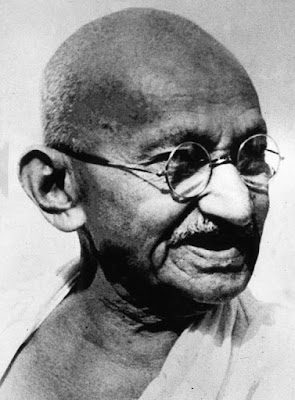Of crucial significance to those who need a better life for humanity. The political map of the world has changed radically since his period, the financial situation has seen unleashing of several disturbing forces, and also the societal set-up has gotten a huge shift.
The significance of moral and ethical dilemmas raised by him, nevertheless, remain central to the future of people and countries. We can derive inspiration in the teachings of Mahatma Gandhi who desired us to bear in mind the age-old expression, "Despite death, life continues, and despite hatred, love remains."
Gandhi died on January 30, 1948. The ashes of Mahatma Gandhi were divided into parts And delivered to all state of India to be sprinkled in rivers. Gandhi's ashes are at the Lake Shrine in Los Angeles.
Biography of Mahatma Gandhi:
 |
| www.wikipedia.com |
Early life:
Mohandas Karamchand Gandhi was born on October 2, 1869, in Porbandar, a little city in Gujarat, on the seashore of Western India. He had been born at the distinguished family of mates. His grandfather had climbed to be the Dewan or even Prime Minister of Porbandar and has been succeeded by his dad Karamchand Gandhiji. His mum Putlibai, a spiritual individual, had significant participation in molding the character of youthful Mohan.
Independence movement:
1869 to January 30, 1948, was the pioneer of India's non-violent independence movement against British rule and also in South Africa who advocated for the civil rights of Indians. Produced in Porbandar, India, Gandhi studied law and organized boycotts against British associations in calm types of civil disobedience. He had been murdered by a buff in 1948.
Throughout the South, He coordinated the Indian Ambulance Corps of 300 Indian volunteers along with countless partners to serve injured black South Africans. He had been nominated for his courage in the Battle of Spion Kop.
At the point, Gandhi corresponded with Leo Tolstoy and voiced his admiration of the Tolstoyan essentials of non-violence. In 1906 Gandhi, for the very first time, organized a non-violent immunity against the Transvaal government's enrollment action.
At the point, Gandhi corresponded with Leo Tolstoy and voiced his admiration of the Tolstoyan essentials of non-violence. In 1906 Gandhi, for the very first time, organized a non-violent immunity against the Transvaal government's enrollment action.
He called upon his fellow Indians to defy the law at a non-violent fashion and endure the punishment for doing this. He had been jailed on several events together with thousands of his fans. But, Gandhi encouraged the British in World War I and invited Indians to join the Army to defend the British Empire, according to the Complete citizenship requirement.
He spoke at the conventions of the Indian National Congress, getting one of its own leaders. In 1918, Gandhi compared the rising taxation imposed by the British throughout the catastrophic famine.
He spoke at the conventions of the Indian National Congress, getting one of its own leaders. In 1918, Gandhi compared the rising taxation imposed by the British throughout the catastrophic famine.
He had been detained in Champaran, say Bihar, for coordinating civil immunity of tens of thousands of landless farmers and serfs. In prison, Gandhi was on a hunger strike in solidarity with all the famine-stricken farmers. Thousands and thousands of his fans gathered around the prison.
Gandhi was addressed by most folks as Mahatma and Bapu. He had been published. He then reflected that the farmers in conversation with the British government. His campaign worked. The tax group was suspended and all prisoners were released.
Gandhi was addressed by most folks as Mahatma and Bapu. He had been published. He then reflected that the farmers in conversation with the British government. His campaign worked. The tax group was suspended and all prisoners were released.
Swaraj:
He announced that all violence was bad following the Amritsar massacre of 379 civilians by British troops, which traumatized the Indian state. Since the chief of the Indian National Congress party Gandhi launched"Swaraj", a campaign for liberty and non-cooperation together with the British government.
He encouraged Indians to substitute British products with their own clothes and products. He had been imprisoned from 1922-1924, being discharged following an appendectomy. Throughout this time that the Swaraj Party was shaped by his worried competitions; it afterward dissolved back to the Congress.
He encouraged Indians to substitute British products with their own clothes and products. He had been imprisoned from 1922-1924, being discharged following an appendectomy. Throughout this time that the Swaraj Party was shaped by his worried competitions; it afterward dissolved back to the Congress.
Gandhi returned to India to find himself imprisoned after more In January 1932 through a crackdown from India's new viceroy, Lord Willingdon. Following his final release, Gandhi left the Indian National Congress in 1934, He Resigned from politics to concentrate on education, poverty and the issues Afflicting India's rural regions.
Gandhi stated, "Before Partitioning India, my body might need to be cut into two pieces" About One thousand people died in the bloody riots until the trailer was Maintained by Gandhi since the sole means to halt the Civil War.
He urged that the Congress Party take partition, and started his past"fast-unto-death" Effort in Delhi, calling for a halt to all violence. Gandhi was also known to give Pakistan that the 550,000,000 rupees in honor of this partition arrangement. He strove To reduce uncertainty and anger from India.
He urged that the Congress Party take partition, and started his past"fast-unto-death" Effort in Delhi, calling for a halt to all violence. Gandhi was also known to give Pakistan that the 550,000,000 rupees in honor of this partition arrangement. He strove To reduce uncertainty and anger from India.